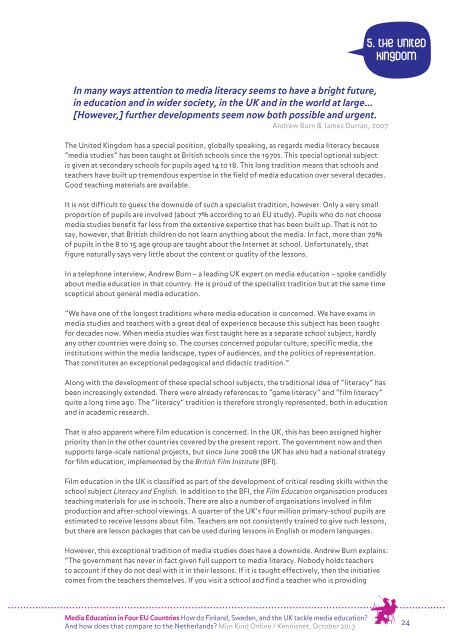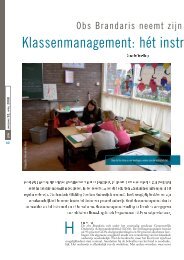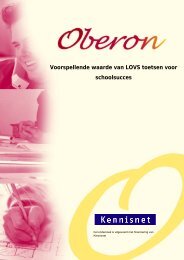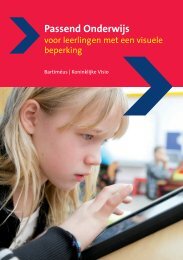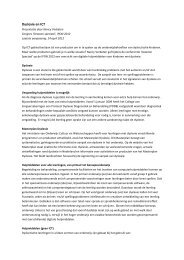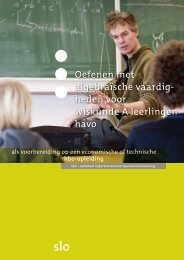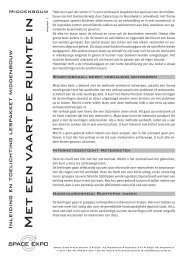Media education in Four eu countries - Kennisnet
Media education in Four eu countries - Kennisnet
Media education in Four eu countries - Kennisnet
Create successful ePaper yourself
Turn your PDF publications into a flip-book with our unique Google optimized e-Paper software.
5. The UnitedK<strong>in</strong>gdomIn many ways attention to media literacy seems to have a bright future,<strong>in</strong> <strong>education</strong> and <strong>in</strong> wider society, <strong>in</strong> the UK and <strong>in</strong> the world at large…[However,] further developments seem now both possible and urgent.Andrew Burn & James Durran, 2007The United K<strong>in</strong>gdom has a special position, globally speak<strong>in</strong>g, as regards media literacy because“media studies” has been taught at British schools s<strong>in</strong>ce the 1970s. This special optional subjectis given at secondary schools for pupils aged 14 to 18. This long tradition means that schools andteachers have built up tremendous expertise <strong>in</strong> the field of media <strong>education</strong> over several decades.Good teach<strong>in</strong>g materials are available.It is not difficult to guess the downside of such a specialist tradition, however. Only a very smallproportion of pupils are <strong>in</strong>volved (about 7% accord<strong>in</strong>g to an EU study). Pupils who do not choosemedia studies benefit far less from the extensive expertise that has been built up. That is not tosay, however, that British children do not learn anyth<strong>in</strong>g about the media. In fact, more than 70%of pupils <strong>in</strong> the 8 to 15 age group are taught about the Internet at school. Unfortunately, thatfigure naturally says very little about the content or quality of the lessons.In a telephone <strong>in</strong>terview, Andrew Burn – a lead<strong>in</strong>g UK expert on media <strong>education</strong> – spoke candidlyabout media <strong>education</strong> <strong>in</strong> that country. He is proud of the specialist tradition but at the same timesceptical about general media <strong>education</strong>.“We have one of the longest traditions where media <strong>education</strong> is concerned. We have exams <strong>in</strong>media studies and teachers with a great deal of experience because this subject has been taughtfor decades now. When media studies was first taught here as a separate school subject, hardlyany other <strong>countries</strong> were do<strong>in</strong>g so. The courses concerned popular culture, specific media, the<strong>in</strong>stitutions with<strong>in</strong> the media landscape, types of audiences, and the politics of representation.That constitutes an exceptional pedagogical and didactic tradition.”Along with the development of these special school subjects, the traditional idea of “literacy” hasbeen <strong>in</strong>creas<strong>in</strong>gly extended. There were already references to “game literacy” and “film literacy”quite a long time ago. The “literacy” tradition is therefore strongly represented, both <strong>in</strong> <strong>education</strong>and <strong>in</strong> academic research.That is also apparent where film <strong>education</strong> is concerned. In the UK, this has been assigned higherpriority than <strong>in</strong> the other <strong>countries</strong> covered by the present report. The government now and thensupports large-scale national projects, but s<strong>in</strong>ce June 2008 the UK has also had a national strategyfor film <strong>education</strong>, implemented by the British Film Institute (BFI).Film <strong>education</strong> <strong>in</strong> the UK is classified as part of the development of critical read<strong>in</strong>g skills with<strong>in</strong> theschool subject Literacy and English. In addition to the BFI, the Film Education organisation producesteach<strong>in</strong>g materials for use <strong>in</strong> schools. There are also a number of organisations <strong>in</strong>volved <strong>in</strong> filmproduction and after-school view<strong>in</strong>gs. A quarter of the UK’s four million primary-school pupils areestimated to receive lessons about film. Teachers are not consistently tra<strong>in</strong>ed to give such lessons,but there are lesson packages that can be used dur<strong>in</strong>g lessons <strong>in</strong> English or modern languages.However, this exceptional tradition of media studies does have a downside. Andrew Burn expla<strong>in</strong>s:“The government has never <strong>in</strong> fact given full support to media literacy. Nobody holds teachersto account if they do not deal with it <strong>in</strong> their lessons. If it is taught effectively, then the <strong>in</strong>itiativecomes from the teachers themselves. If you visit a school and f<strong>in</strong>d a teacher who is provid<strong>in</strong>g<strong>Media</strong> Education <strong>in</strong> <strong>Four</strong> EU Countries How do F<strong>in</strong>land, Sweden, and the UK tackle media <strong>education</strong>?And how does that compare to the Netherlands? Mijn K<strong>in</strong>d Onl<strong>in</strong>e / <strong>Kennisnet</strong>, October 201324


